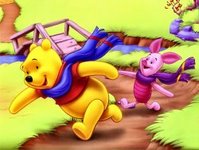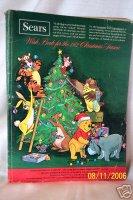And that noun phrase--"blustery day"--is affectively linked in my mind to Winnie the Pooh. Just say "blustery day" to me, and I'll instantly be filled with pleasant feelings, all of which have the orange haze of Pooh surrounding them.
In fact, I think "Winnie the Pooh and the Blustery Day,"

an animated children's special that ran each fall of my childhood, along with Charlie Brown specials and such, must have been my first exposure to Pooh. And it's funny, because in my mind Pooh is aligned not only with blustery days, but also with a certain early twentieth century Britishness. (I was something of an Anglophile back in the day--and I'm wondering now if Sebastian Cabot's narration might have been a contributing factor to that. Of course, Sebastian Cabot also appeared in one of my favorite childhood TV shows, Family Affair. Mrs. Beasley!) So it's fun to think about the mediation of Pooh in the early 1970s, and how that mediation is what brought a kind of old rural Britain nostalgia home to me.
That mediation inspired a backward movement, too, so that A. A. Milne's books were among the first "long" books I read. I ordered The House at Pooh Corner from the Scholastic book order form. (Did you get those at your school? I don't know how long this was a phenomenon; I just know it was one of the most exciting moments of my school year when they were passed out. In addition to The House at Pooh Corner, I remember ordering a book about Florence Nightingale, which was billed as a kind of proto-feminist story. I did not come from a feminist family, so this seemed subversive to me at seven. I also ordered compilations of Charlie Brown comics.)
And those A. A. Milne books were curiousities, because the black and white drawings by Ernest Shepard looked very little like the adaptations of Pooh on the television. For one thing, the Pooh of the books did not wear a little red shirt. He had a big barrel of a body. His face was less broad--more solemn, really. More like a creature who would say, "Oh, bother," than the childish, happy face on TV.
(The House at Pooh Corner also got an audio spin, thanks to Kenny Loggins and the Nitty Gritty Dirt Band.
Given the "dirt" in the name of the band, I felt that perhaps they weren't very nice. But then how could they sing about Pooh? Ah, such contradictions to deal with at such a young age!)
I had a stuffed Pooh at home. He resembled the Pooh on TV (though less like the stuffed Poohs these days, which look *totally* like the animated Pooh), with a red shirt (embroidered with "Pooh" on the front) and no slouch. Back then, you could get a stuffed Pooh only from Sear's. Somewhere along the way they lost their exclusive rights, but back in the 70s, Pooh was like a Sears trademark. Just take a look at this 1972 "Wish Book":

But the Pooh in the books, while special to Christopher Robin, wasn't really special as a plush toy, and that's what the drawings emphasis--he's really pretty ordinary. A plain looking stuffed bear. What's extraordinary is the imagination that enlivens him, sends him on (somewhat mundane) adventures.
Ordinary isn't so good for marketing. In the Signals catalogue (for fans of Public Television--they apparently like expensive do-dads)that arrived yesterday, I saw a stuffed Pooh from Steiff. Limited numbers available. For the unbelievable price of $395.
For a stuffed bear. A much mediated stuffed bear.
And I'm only scratching the surface here. I haven't even touched upon the many bookish manifestations of Pooh--The Tao of, the Latin translation of.
The multi-modally circulating Pooh affect.
(And there's the official Pooh website, too.)

2 comments:
D- you will be happy to know that indeed, twice a year, Z brings home a ball of small slips of paper for ordering books (and now other silly gadgets) from places like scholastic. But now that he is on the other-side, he finds such orderings a pain in the you know what. He is especially sad that the books tend to be classified as boy's books and girl's books--ick. And now the little orders are not for books but for mini-pdas that store addresses and datebooks AND games. Now where is it that pooh would fit into today? Sigh...
The dude is completely just, and there is no suspicion.
Post a Comment